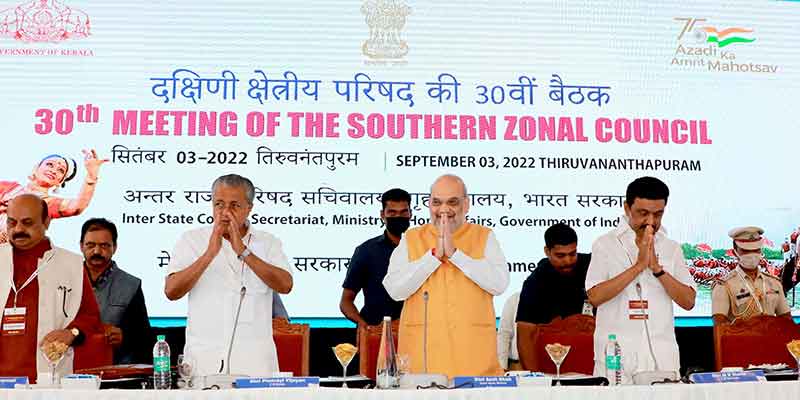- India
- Sep 05
Amit Shah chairs 30th Southern Zonal Council meeting
Union Minister for Home and Cooperation Amit Shah chaired the 30th Southern Zonal Council meeting in Thiruvananthapuram on September 3.
The meeting was attended by the CMs of Kerala, Karnataka, Tamil Nadu — Pinarayi Vijayan, M.K. Stalin and Basavaraj Bommai, respectively, the LGs of Puducherry and Andaman and Nicobar Islands and the Administrator of Lakshadweep.
The participating chief ministers and lieutenant governors made various demands pertaining to their states and union territories.
Shah urged southern states to explore joint solution for river water sharing issues.
In the meet, as many as 26 issues were discussed, nine issues were resolved, 17 issues were reserved for further consideration out of which 9 issues are related to reorganisation of Andhra Pradesh.
What is a zonal council?
• The idea of creation of zonal councils was mooted by PM Jawaharlal Nehru in 1956 when during the course of debate on the report of the States Reorganisation Commission, he suggested that the states proposed to be reorganised may be grouped into four or five zones having an advisory council to develop the habit of cooperative working.
• This suggestion was made at a time when linguistic hostilities and bitterness as a result of reorganisation of states on linguistic pattern were threatening the very fabric of our nation. As an antidote to this situation, it was suggested that a high-level advisory forum should be set up to minimise the impact of these hostilities and to create healthy inter-state and Centre-state environment with a view to solving inter-state problems and fostering balanced socio economic development of the respective zones.
• Five zonal councils were set up in 1957 under Sections 15-22 of the States Reorganisation Act, 1956. The composition is as follows.
i) Northern Zonal Council - Haryana, Himachal Pradesh, Jammu & Kashmir, Ladakh, Punjab, Rajasthan, Delhi and Chandigarh.
ii) Central Zonal Council - Chhattisgarh, Uttarakhand, Uttar Pradesh and Madhya Pradesh.
iii) Eastern Zonal Council - Bihar, Jharkhand, Odisha and West Bengal.
iv) Western Zonal Council - Goa, Gujarat, Maharashtra and Daman & Diu and Dadra & Nagar Haveli.
v) Southern Zonal Council - Andhra Pradesh, Telangana, Karnataka, Kerala, Tamil Nadu and Puducherry.
• The Northeastern states — Assam, Arunachal Pradesh, Manipur, Tripura, Mizoram, Meghalaya and Nagaland — are not included in the zonal councils and their special problems are looked after by the North Eastern Council, set up under the North Eastern Council Act, 1972. Sikkim has also been included in the North Eastern Council.
Organisational structure
• The Union home minister is the chairman of each of these five zonal councils.
• The chief ministers of the states included in each zone act as vice-chairmen of the zonal council by rotation, each holding the office for one year at a time.
• The members of the council include the chief minister and two other ministers as nominated by the governor from each of the states and two members from Union territories included in the zone.
• Each zonal council has set up a standing committee consisting of chief secretaries of the member states. These standing committees meet from time to time to resolve the issues or to do necessary groundwork for further meetings of the zonal councils.
What is their significance?
• The zonal councils provide a platform to foster such collaboration through a structured mechanism for dialogue and discussion on a continuous basis on the issues affecting two or more states or the Centre and states, in the spirit that strong states make a strong nation.
• The zonal councils take up issues involving the Centre and states and one or many states falling in the zone. The councils, thus, provide a forum for resolving disputes and irritants between the Centre and states and among states in the zone.
• The zonal councils discuss a broad range of issues which include boundary-related disputes, security, infrastructure-related matters like road, transport, industries, water, and power, matters pertaining to forests and environment, housing, education, food security, tourism and transport.
• Being advisory bodies, there is full scope for free and frank exchange of views in their meetings.
• Though there are a large number of other fora like the National Development Council, Inter-State Council, governors / chief ministers conferences and other periodical high-level conferences held under the auspices of the Union government, the zonal councils are different, both in content and character. They are regional fora of cooperative endeavour for states linked with each other economically, politically and culturally.
• Being compact high-level bodies, specially meant for looking after the interests of respective zones, they are capable of focusing attention on specific issues taking into account regional factors, while keeping the national perspective in view.
Manorama Yearbook app is now available on Google Play Store and iOS App Store

